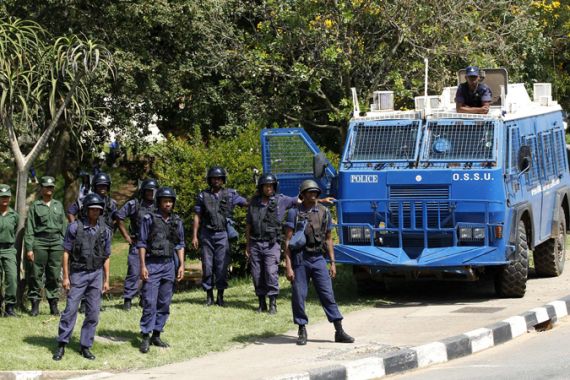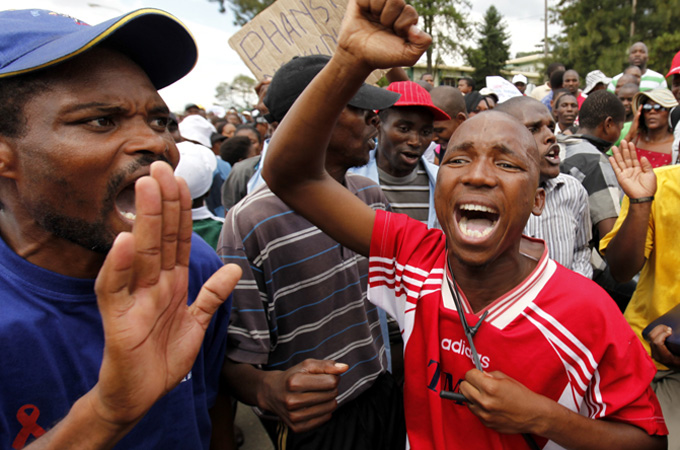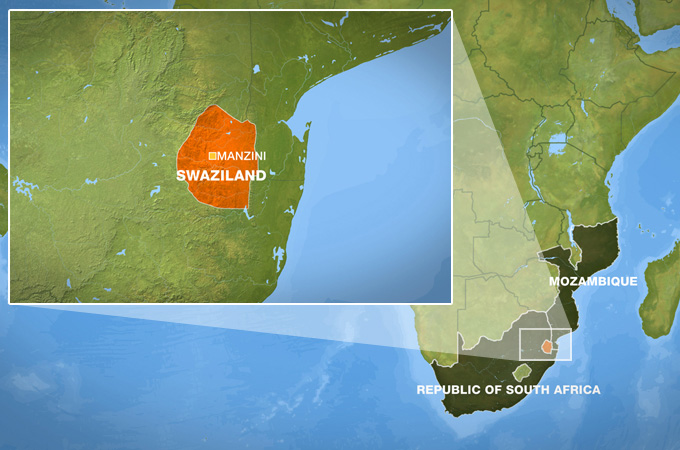Crackdown in Swaziland as unrest grows
Police fire tear gas and water cannons at hundreds of teachers as they planned to protest in Manzini.

 |
| The protests are the latest in a series of demonstrations against the monarchy that started in mid-March[Reuters] |
Police have fired tear gas and water cannons for a second day at teachers poised to march in Swaziland’s commercial capital.
As union leaders met Wednesday to discuss their protest strategy, police burst into their headquarters in Manzini where more than 300 teachers were singing liberation songs, chanting and dancing.
Police fired tear gas and water cannons, dispersing the crowd. Some teachers hid in nearby bushes.
Arrests and curfew
Meanwhile, an activist and organiser on the ground, who asked to remain anonymous, told Al Jazeera that “more than five protesters have been arrested for attempting to restart the intermittent protests currently going on in the centre of Manzini”.
 |
“Protesters are gathered in a large crowd in the middle of the bus rank and are refusing to bow down to police demands that they disperse.
The activist said a curfew had been declared in Manzini from 6pm. “All police officers have been deployed in Manzini, where the action is concentrated,” he said.
Swazi union leaders and pro-democracy activists are divided as to how to proceed after security forces on Tuesday fired tear gas and water cannons, beat people with batons and arrested activists.
Sibongile Mazibuko, president of the Swaziland National Association of Teachers, said earlier on Wednesday that teachers had called off protests for security reasons, as police had jailed teachers for treason and beaten those gathered at the headquarters on Tuesday.
Mazibuko was released after being detained all day Tuesday. She said she had gone into hiding.
Heavy security
Heavy security in the country’s usually placid commercial capital ensured that Tuesday’s pro-democracy protests did not happen. Activists had planned the protests to mark exactly 38 years since the current Swazi king’s father, King Sobhuza II, banned political parties and abandoned the country’s
constitution.
| A continent’s discontent |
|
|
Macanjana Motsa, the government spokeswoman, did not immediately return calls for comment.
A pro-democracy movement in Swaziland, spearheaded by the unions, has taken root since the government announced in March its plan to freeze civil service salaries and sell off state-run companies.
Swaziland is sub-Saharan Africa’s last absolute monarchy, and human rights activists criticise the wealthy king’s lavish lifestyle while most Swazis live in poverty.
The country is wrought with unemployment and has the highest rate of Aids in the world. More than a quarter of the population is said to be HIV positive, according to an October 2010 report by USAID.
